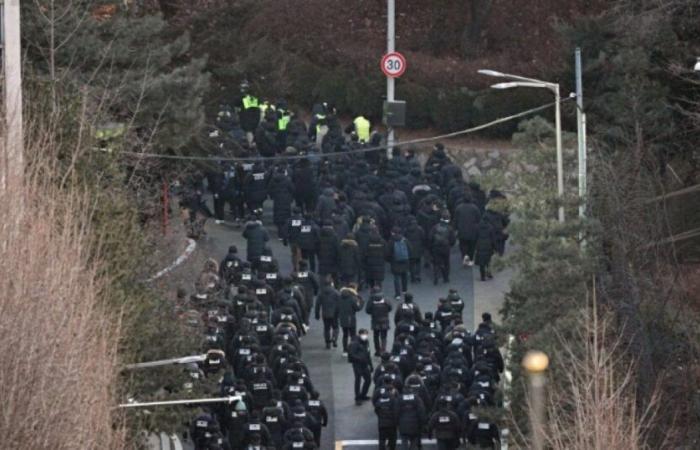South Korea's suspended president, Yoon Suk Yeol, was arrested Wednesday in a raid by investigators, an unprecedented move mirroring the political crisis caused by his failed attempt to impose martial law in early December.
After an initial raid which turned into a fiasco at the beginning of January, agents from the Office for the Investigation of Corruption of High Personalities (CIO) and the police showed up in large numbers, before dawn, at the residence where the former prosecutor had been holed up for weeks in an upscale neighborhood of Seoul.
Entering his home by first going over the surrounding wall with ladders, investigators announced that they had apprehended him at 10:33 a.m. (01:33 GMT). Mr. Yoon was then taken to the IOC offices, where he is in police custody.
Never before has a sitting South Korean head of state been arrested.
“I have decided to respond to the Corruption Investigation Bureau,” Yoon announced in a video message, adding that he did not recognize the legality of the investigation but was submitting to it “for avoid any unfortunate bloodshed.”
Suspended by deputies and targeted by an investigation for “rebellion”, a crime punishable by death, Yoon Suk Yeol had until then refused to respond to summons, pushing prosecutors to use arrest warrants in order to arrest him. force it.
He is “exercising his right to remain silent” for the moment, the IOC told the press early in the afternoon.
An official said Mr. Yoon refused to be filmed during his interrogation and would spend the night in a detention center.
Yoon Suk Yeol may be held for 48 hours under the current warrant. A new order would be necessary to possibly extend the duration.
– Message on Facebook –
In a message published on Facebook after the events, which the former prosecutor claims to have written while he was barricaded in his home, he repeats his accusations of electoral fraud and once again inveighs against the “hostile” forces attacking South Korea, making allusion to Pyongyang.
Mr. Yoon is in turmoil for having briefly introduced martial law on December 3, a shock measure reminiscent of the dark hours of the military dictatorship. He then justified it by his desire to protect the country from “North Korean communist forces” and to “eliminate elements hostile to the State”.
In a Parliament surrounded by soldiers, the deputies had foiled his plans by voting on a text demanding the lifting of this state of exception. Put under pressure by elected officials, thousands of pro-democracy demonstrators and constrained by the Constitution, Yoon Suk Yeol had to comply.
He has been suspended since the adoption on December 14 of a motion for dismissal in the National Assembly and is awaiting the judgment of the Constitutional Court to know whether he will be definitively dismissed or reinstated in his functions. The court has until mid-June to rule, with Mr. Yoon officially remaining president until then.
– The chaos is “over” –
On January 3, the Presidential Security Service (PSS), responsible for protecting heads of state, blocked the IOC's initial attempt to execute a first arrest warrant against Mr. Yoon.
For their second raid, prompted by a new arrest order, the authorities had warned that they would apprehend anyone who obstructed them.
Brief altercations first broke out in front of the gate of the residence, where thousands of supporters were camped determined to defend Mr. Yoon.
The arrest of Yoon Suk Yeol is “the first step towards the return of order”, welcomed Park Chan-dae, head of deputies of the Democratic Party (main opposition force) in Parliament.
“History will inevitably remember that the IOC and the police carried out an unjust and illegal mandate,” criticized Kweon Seong-dong, his counterpart from the People's Power Party (PPP) from which Mr. Yoon comes.
With the chaos “over,” Parliament Speaker Woo Won-shik called for focusing “efforts on stabilizing state affairs and restoring people’s livelihoods.”
On Tuesday, the Constitutional Court formally launched the impeachment trial of Yoon Suk Yeol. The latter did not appear at the first hearing, which was subsequently shortened, citing “concerns” about security.
The procedure will continue even without him. A second hearing is scheduled for Thursday.






